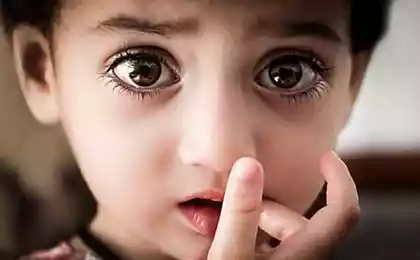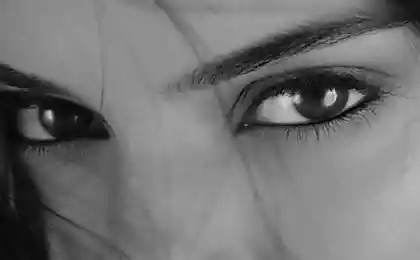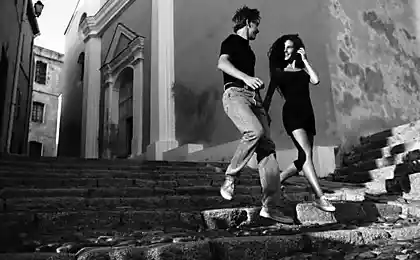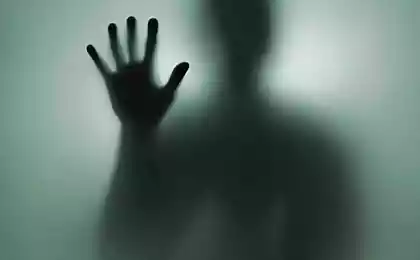587
Why are we afraid to look in the eye
People don't like to look in the eye. Why do we look away? How often do we do that? Looking into the eyes of liars? Modern science has its own answers to these and other questions.
The eyes are the mirror of the soul the Specialists of the University of California are convinced that the quality of communication is 93% as determined by non-verbal means. Body language, tone, voice and, of course, the expression of the eyes – all this helps to understand what actually the person wants to say.
Other figures given in the study under the direction of Yannick and Steven Rodney Wellens from the University of Miami in Florida: 44% of the attention during intercourse are concentrated in the eyes and only 12% — in the mouth. The eyes are a "litmus test" of our emotions: they reflect the fear, the frustration, the bitterness, the joy... But why then do we so often avert our eyes?
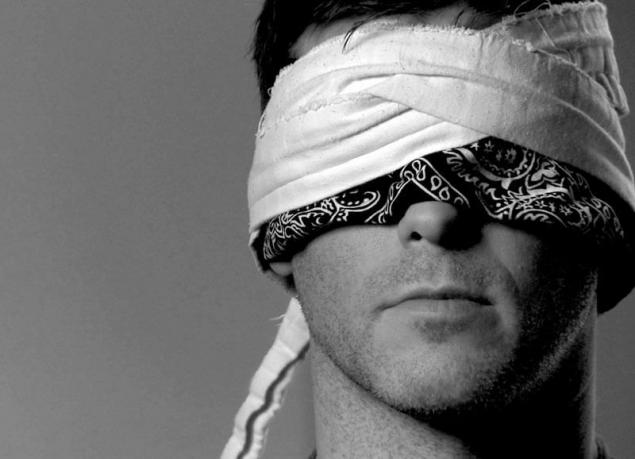
Attempt to focus
Psychologists Fiona Phelps and Gwyneth Doherty Sneddon in his work "Glance-aversion" tried to determine the dependence of the duration of the gaze away from the way of obtaining information and the level of its complexity. They conducted an experiment in which two groups of 8-year-olds asking easy and difficult questions, with the first received information on the principle of "face to face", and the second via the video monitor. It turned out that the more complex was the question, the more often the child looked away in an attempt to focus and find the answer. Interestingly, a similar situation was observed more often in groups where the dialogue lined up face to face.
A liar? Liar!
There is a strong stereotype that during the lies people can't look your partner in the eye. However, the British psychologists from the University of Portsmouth believe that everything happens exactly the opposite.Speaking the truth wants to make sure his "noodles" settled securely on your ears, so it continuously monitor your emotions, staring eyes. But does such behavior? The power of persuasion a Series of experiments conducted by psychologists by Francis Chen of the University of British Columbia and Julia Minson, of the Kennedy School at Harvard University, showed thatthe closer the speaker looks into the eyes of the interlocutor, the less convincing they seem his speech.
Have you ever noticed that many public officials do not look in the eye, and just below or in the nose? Close visual contact can often be interpreted as a clear attempt to impose their point of view. One-on-one by British scientists from the University of Portsmouth has also shown that people look longer at the eyes, if you are with him one-on-one — an average of 7-10 seconds. This time is reduced to 3-5 seconds, if the communication takes place in groups.
Triangle flirtation
Smile, wink, stare straight into the eyes... Such behavior is regarded in modern society as an attempt of flirting. Probably many of us avoid long eye contact for this reason. Suddenly people will think that something is not right? Communications consultant Susan Rabin in his book "101 ways to flirt" confirms this stereotype: long eye contact is extremely important for flirting, that men and women use different "technology". If the representatives of a strong half of mankind prefer the straight look that they instinctively think a manifestation of strength and courage, women "slide" look at the so-called "triangle of flirtation": lady first visually exploring entire object if the test passed the test successfully, the opinion "rests" in the eye.
The reason for the misery of
Dr Peter hills, who teaches psychology at the University of Anglia Ruskin, in collaboration with Dr. Michael Lewis of Cardiff University published an article which States that eye contact try to avoid unhappy people. They are more likely to pay attention to new hairstyle, beautiful shoes, or perfume. Perhaps it is because the suffering person does not want to experience the true emotional state of the interlocutor. He and his problems "through the roof"!
Visual, auditory or kinestetik?
Neuro-linguists suggest their own explanation. Does the person look in the eyes or tries to quickly look away – it depends on the way of his thinking.Visual thinking with visual images, so they need to focus on the eyes to "read" the missing information. For audio important sounds — they would rather listen to the timbre and tone of voice, staring off to the side. Kinesthetic, relying on intuition and tactile sensations during intercourse and try to touch the interlocutor, to hug, to shake hands, while they usually look down.
Aggression, or What he needs?
Social psychologist Julia A. Minson was convinced that visual contact, on the one hand, a very intimate process, with another – it could reflect the desire of one man to dominate others. "Animals will never look into each other eyes, — said Julia, — if you won't then fight for supremacy". Indeed, gazing at you, the person creates anxiety and many questions.
If it's a stranger on public transport or at a deserted bus stop, then the question immediately arises: "What does he want?" Nervousness can lead to mutual aggression. If the eye stares colleague, good friend or the nice lady in the supermarket, I want to quickly look at yourself in the mirror and check that you are not stuck to the teeth parsley during lunch or nothing comes out if ink. Each of us have experienced similar feelings of unease, so often we prefer to quickly look away.published
Author: Faina Shatrov
P. S. And remember, just changing your mind — together we change the world! ©
Join us in Facebook , Vkontakte, Odnoklassniki
Source: russian7.ru/2015/11/pochemu-my-boimsja-smotret-v-glaza/
The eyes are the mirror of the soul the Specialists of the University of California are convinced that the quality of communication is 93% as determined by non-verbal means. Body language, tone, voice and, of course, the expression of the eyes – all this helps to understand what actually the person wants to say.
Other figures given in the study under the direction of Yannick and Steven Rodney Wellens from the University of Miami in Florida: 44% of the attention during intercourse are concentrated in the eyes and only 12% — in the mouth. The eyes are a "litmus test" of our emotions: they reflect the fear, the frustration, the bitterness, the joy... But why then do we so often avert our eyes?

Attempt to focus
Psychologists Fiona Phelps and Gwyneth Doherty Sneddon in his work "Glance-aversion" tried to determine the dependence of the duration of the gaze away from the way of obtaining information and the level of its complexity. They conducted an experiment in which two groups of 8-year-olds asking easy and difficult questions, with the first received information on the principle of "face to face", and the second via the video monitor. It turned out that the more complex was the question, the more often the child looked away in an attempt to focus and find the answer. Interestingly, a similar situation was observed more often in groups where the dialogue lined up face to face.
A liar? Liar!
There is a strong stereotype that during the lies people can't look your partner in the eye. However, the British psychologists from the University of Portsmouth believe that everything happens exactly the opposite.Speaking the truth wants to make sure his "noodles" settled securely on your ears, so it continuously monitor your emotions, staring eyes. But does such behavior? The power of persuasion a Series of experiments conducted by psychologists by Francis Chen of the University of British Columbia and Julia Minson, of the Kennedy School at Harvard University, showed thatthe closer the speaker looks into the eyes of the interlocutor, the less convincing they seem his speech.
Have you ever noticed that many public officials do not look in the eye, and just below or in the nose? Close visual contact can often be interpreted as a clear attempt to impose their point of view. One-on-one by British scientists from the University of Portsmouth has also shown that people look longer at the eyes, if you are with him one-on-one — an average of 7-10 seconds. This time is reduced to 3-5 seconds, if the communication takes place in groups.
Triangle flirtation
Smile, wink, stare straight into the eyes... Such behavior is regarded in modern society as an attempt of flirting. Probably many of us avoid long eye contact for this reason. Suddenly people will think that something is not right? Communications consultant Susan Rabin in his book "101 ways to flirt" confirms this stereotype: long eye contact is extremely important for flirting, that men and women use different "technology". If the representatives of a strong half of mankind prefer the straight look that they instinctively think a manifestation of strength and courage, women "slide" look at the so-called "triangle of flirtation": lady first visually exploring entire object if the test passed the test successfully, the opinion "rests" in the eye.
The reason for the misery of
Dr Peter hills, who teaches psychology at the University of Anglia Ruskin, in collaboration with Dr. Michael Lewis of Cardiff University published an article which States that eye contact try to avoid unhappy people. They are more likely to pay attention to new hairstyle, beautiful shoes, or perfume. Perhaps it is because the suffering person does not want to experience the true emotional state of the interlocutor. He and his problems "through the roof"!
Visual, auditory or kinestetik?
Neuro-linguists suggest their own explanation. Does the person look in the eyes or tries to quickly look away – it depends on the way of his thinking.Visual thinking with visual images, so they need to focus on the eyes to "read" the missing information. For audio important sounds — they would rather listen to the timbre and tone of voice, staring off to the side. Kinesthetic, relying on intuition and tactile sensations during intercourse and try to touch the interlocutor, to hug, to shake hands, while they usually look down.
Aggression, or What he needs?
Social psychologist Julia A. Minson was convinced that visual contact, on the one hand, a very intimate process, with another – it could reflect the desire of one man to dominate others. "Animals will never look into each other eyes, — said Julia, — if you won't then fight for supremacy". Indeed, gazing at you, the person creates anxiety and many questions.
If it's a stranger on public transport or at a deserted bus stop, then the question immediately arises: "What does he want?" Nervousness can lead to mutual aggression. If the eye stares colleague, good friend or the nice lady in the supermarket, I want to quickly look at yourself in the mirror and check that you are not stuck to the teeth parsley during lunch or nothing comes out if ink. Each of us have experienced similar feelings of unease, so often we prefer to quickly look away.published
Author: Faina Shatrov
P. S. And remember, just changing your mind — together we change the world! ©
Join us in Facebook , Vkontakte, Odnoklassniki
Source: russian7.ru/2015/11/pochemu-my-boimsja-smotret-v-glaza/

